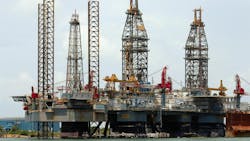Report: Second-quarter rig contracting activity characterized as ‘slow’
The month of June has been “rather quiet” in the offshore drilling market heading into the second quarter reporting season, according to Evercore ISI’s latest Offshore Rig Market Snapshot.
The report characterized recent contracting activity as “slow,” with 23 contracts (and extensions) announced since June across both floaters and jackups.
However, average contract durations notably increased for jackups, which exceeded 1,000 days in July, primarily driven by the Admarine 657 (ADES) at 3,651 days; the Zhenhai 6 (COSL) at 848 days; and the Baltic (Shelf Drilling) at 731 days.
The Admarine 657 was awarded a 10-year extension by Saudi Aramco, and the contract is expected to commence in 3Q 2024 immediately upon expiry of the current term ending in July. The contract adds $351 million (1,317 million SAR) to the backlog.
Two jackups, the Zhenhai 6 and the Baltic, were awarded longer-term contracts in China and Malaysia, respectively. Following Saudi Aramco’s rig releases, the COSL jackup Zhenhai 6 is en route to China for work with CNOOC, which is expected to begin in 3Q 2024.
While contracting activity was somewhat subdued this past month, the 2024 United Kingdom general election took place earlier in the month and has exacerbated concerns over potential impacts on UK North Sea oil and gas activity. The region was severely impacted by the windfall tax on energy producers which started in 2022. The current tax rate is 35%, scheduled to last until 2029, bringing the total tax burden on producers to 75%. OEUK is concerned that these measures could undermine the investment conditions necessary for the United Kingdom to achieve its energy goals, potentially jeopardizing jobs and the overall economic growth associated with the sector.
As reported by Evercore, OEUK has said that further increasing this tax and ending new licenses could exacerbate these challenges, threatening the stability and growth of the industry, which supports more than 200,000 jobs and threatening industry plans to invest £200 billion in domestic energy projects over the next decade.
